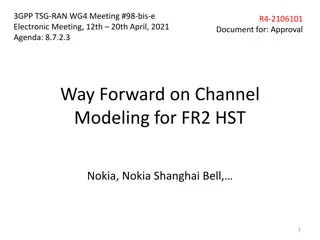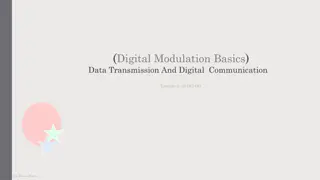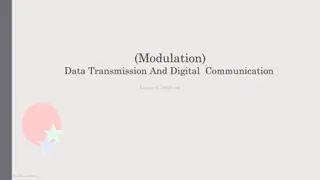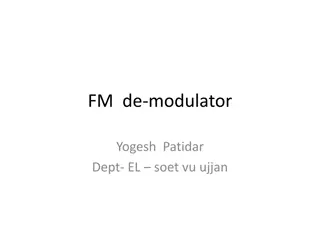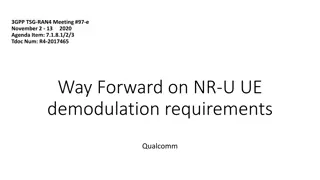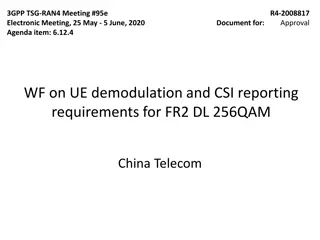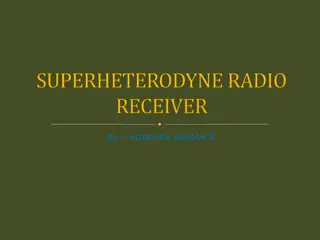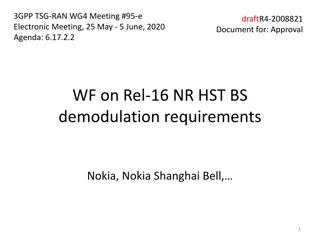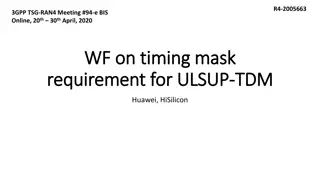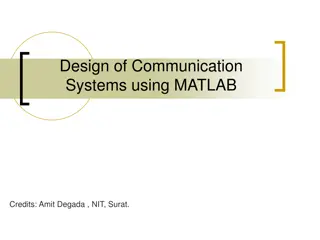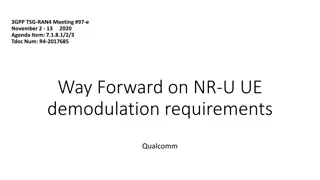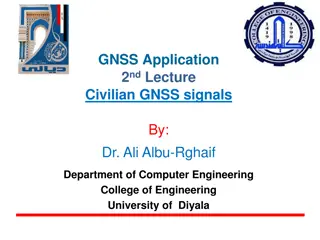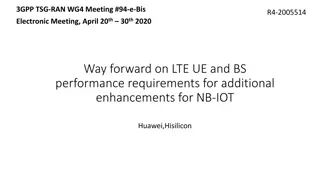3GPP TSG-RAN-WG4 Meeting #98-bis-e Electronic Meeting Summary
The 3GPP TSG-RAN-WG4 Meeting #98-bis-e discussed Channel Modeling for FR2 in the context of NR HST enhancements. Issues related to link budget evaluation and performance requirements were covered. Discussions included channel models for Scenario-B, demodulation performance requirements, and uplink c
0 views • 10 slides
Understanding Digital Modulation in Data Transmission
Delve into the world of digital modulation for data transmission, exploring various modulation schemes, digital-to-analog conversion processes, the importance of digital modulation in mixed networks, and the fundamentals of modulation and demodulation.
0 views • 27 slides
Understanding Modulation in Data Transmission and Digital Communication
Modulation plays a crucial role in data transmission and digital communication by altering the characteristics of a carrier signal based on the message signal. This lecture discusses analog and digital modulation techniques such as AM, FM, PM, and their operations. It covers the basics of amplitude
0 views • 33 slides
Understanding FM Demodulators and Phase-Locked Loops
Explore the world of FM demodulators including Slope Detector, Foster-Seeley Discriminator, Ratio Detector, Pulse-Averaging Discriminators, Quadrature Detectors, and Phase-Locked Loops. Learn about demodulation, Foster-Seeley Discriminator operation, advantages, and disadvantages, as well as the con
3 views • 13 slides
Test Scope and Requirements for NR-U UE Demodulation
The documentation discusses the test scope and requirements for demodulation of NR-U UE, emphasizing semi-static and dynamic channel access devices. It covers specifics such as test scenarios, DL transmission options, CQI requirements, and downlink transmission model. The aim is to prioritize test c
6 views • 13 slides
PDSCH Demodulation Parameters & Requirements Discussion
This document covers the discussion on PDSCH demodulation parameters and requirements for UE demodulation and CSI reporting in FR2 DL 256QAM, specifically focusing on static channel mode, TDL-D channel mode, and TDL-A channel mode. The document also explores rank options, channel bandwidth, PRB allo
0 views • 9 slides
Introduction to Superheterodyne Radio Receiver Circuits
Superheterodyne radio receiver circuits operate based on heterodyne or frequency mixing principles. These circuits involve using a local oscillator to mix the incoming signal with a sine wave, shifting it to an intermediate frequency (IF) for further processing and demodulation. The design includes
0 views • 16 slides
Approval Workflow for Rel-16 NR HST BS Demodulation Requirements
In the TSG-RAN-WG4 Meeting #95-e, various Workflows (WFs) were agreed upon for different scenarios including PUSCH, PRACH, and UL TA. The focus was on defining demodulation requirements for high-speed trains (HST) in the context of 5G NR technology. Manufacturers declared support options for HST sce
0 views • 26 slides
Discussion on Timing Mask Requirement for ULSUP-TDM in RAN4#94e Meeting
In the RAN4#94e and #94e-Bis meetings, discussions were held on the timing mask requirement for ULSUP-TDM, particularly focusing on sub-topics like evaluating uplink timing differences between LTE and NR, clarifying present time mask conditions, and testing time mask requirements. The key issue cent
0 views • 4 slides
Understanding Communication Systems Using MATLAB
MATLAB is a powerful tool for modeling and designing communication systems, with features for signal processing, simulation, and modulation/demodulation functions. Explore analog and digital communication components, simulation hierarchies, and practical applications through MATLAB in this comprehen
0 views • 83 slides
Test Scope and Requirements for NR-U Demodulation in 3GPP TSG-RAN4 Meeting #97-e
The document outlines the test scope and requirements for demodulating NR-U (Unlicensed) signals in the context of the 3GPP TSG-RAN4 Meeting #97-e. It covers topics such as defining test scenarios, bandwidth options, downlink transmission models, and the prioritization of test cases for dynamic chan
0 views • 15 slides
Civilian GNSS Signals Overview: GPS, GLONASS, Galileo
An insightful lecture on civilian GNSS signals by Dr. Ali Albu-Rghaif covers GPS, GLONASS, and Galileo signals. The content delves into GPS signal modulation, generation, receiving, and demodulation processes, highlighting the carrier wave, navigation data, and spreading sequences. It also discusses
0 views • 20 slides
Performance Requirements for LTE UE and BS Enhancements in NB-IoT
Define performance requirements for LTE UE and BS enhancements in NB-IoT by focusing on NPDSCH with interleaved multi-TB scheduling, test applicability rules, simulation results, and parameters for both UE and BS. Companies are encouraged to provide simulations based on specific assumptions to evalu
0 views • 4 slides
